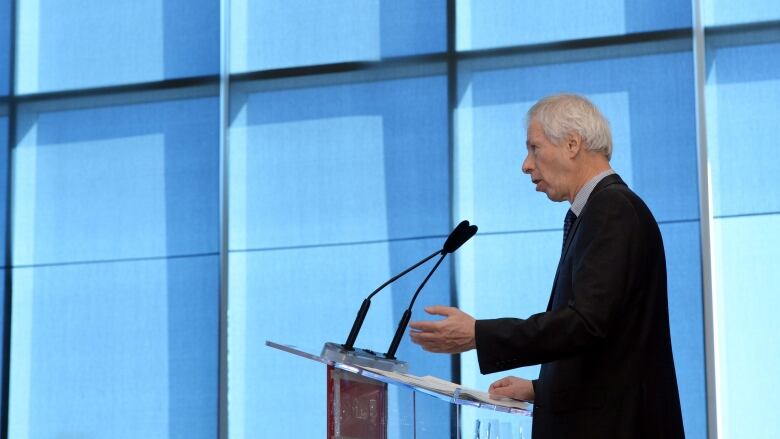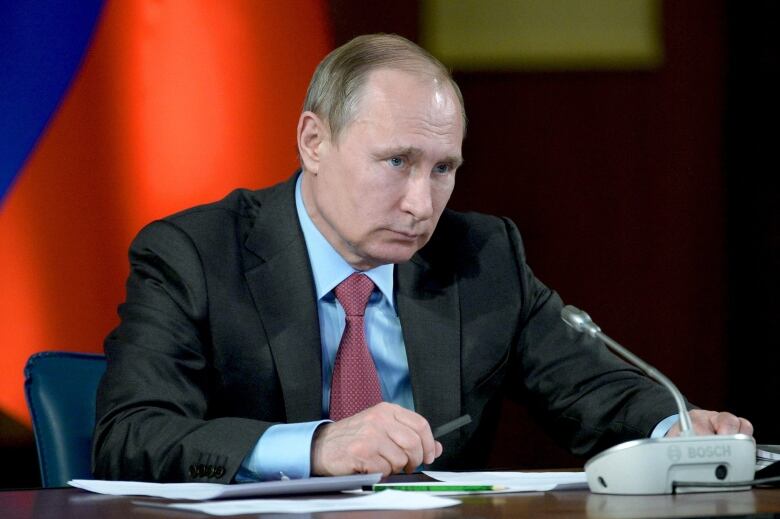Trudeau government signals thaw in relations with Russia
Policy of refusing to engage 'only punishing ourselves,' Stphane Dion tells university audience

Canada's foreign minister seemed to signal a shift in relations with Russia Tuesday in a speech at the University of Ottawa.
Stphane Dion was discussing his philosophy of "responsible conviction," which he says will guide his choices at the helm of Global Affairs Canada.
He says Canada will follow its principles, but do so in a pragmatic manner, on files ranging from the war against ISIS to climate change.
- Dion digs at Tories with new foreign policy label: responsible conviction
- 'Engagement doesn't mean agreement': Dion on Canada's foreign policy
And it appears that approach is leading to something of a thaw in Canada's attitude to the government of Russian President Vladimir Putin.
'No positive consequences'
"Canada's severing of ties with Russia had no positive consequences for anyone," said Dion, "not for Canadians, not for the Russian people, not for Ukraine and not for global security."
"Canada must stop being essentially the only one practicing an empty chair policy with Russia, because by doing so, we are only punishing ourselves."
The "empty chair" policy refers to the 2014 decision by the Harper government to refuse to chair or host or sometimes even participate in multilateral meetings at which a Russian delegation was present, following Russia's military involvement in Ukraine.
This re-engagement [with Russia] will aim to help Ukraine, help Europe and help stabilize the situation in the centre of thecontinent. And it will serve Canadian interests by allowing us to talk to Russia onkey issues like the Arctic- Foreign Affairs Minister Stphane Dion
Dion said the policy left Canada with a diminished role at venues such as the OECD, the International Atomic Energy Agency and international fisheries talks, where other countries were debating issues important to Canada.
"Cooperation is often in our interest on environmental issues, for example given that we are Arctic neighbours, facing similar challenges due to our sharedgeography. It makes no sense to prevent our scientists from working with theirRussian colleagues to protect the northern ecosystem."
Canada's confrontational attitude to Russia, said Dion, had brought "no benefit to Ukraine."
Dion stressed that Canada will continue to oppose Russia's support of separatists in eastern Ukraine, and its annexation of Crimea.
"But doing so is entirely consistent with re-establishing diplomatic discussions with Russia, just as our allies do. This re-engagement will aim to help Ukraine, help Europe and help stabilize the situation in the centre of thecontinent. And it will serve Canadian interests by allowing us to talk to Russia onkey issues like the Arctic."
In response to an email from CBC News, Russia's embassy in Ottawa said Wednesday it welcomed Dion's willingness to re-engage, but also had something of a warning for Canada.
"(The) Liberal government intention, as outlined by Minister Dion, to end Canada's self-isolation from Russia and to get bilateral relations back on track is a timely and welcomed development," embassy press secretary Kirill Kalinin said in an email. "We believe that engagement better serves the interests of both countries, be it anti-terror cooperation, new business opportunities or joint work in the Arctic.
"However, unfriendly steps, following the pattern of confrontation, will be met with resolve and reciprocity," the email concluded.
Contrasts with Conservative policy
Conservative Foreign Affairs critic Tony Clement said the last comment sounds like a threat.
"Unless we talk the way they want us to talk, then all bets are off. That's the Russian bear baring its teeth. And it goes to show that just talking to someone who doesn't share your principles, your values or international norms isn't always going to guarantee success," Clement said in an interview with CBC News Wednesday after this story first appeared.
Clement said the shift is simply "a return to the old Liberal policy of going along to get along" and questioned the notion that Canada's strong stance against Russia has not produced results for Ukraine.
"If he wants us to be a rogue state that is now accommodating Russia at a time when our allies are not doing so, then I think that is a huge turnaround in our foreign policy," Clement told CBC News. "The Ukrainians certainly argue that sanctions are necessary and putting Russia into a corner is necessary."
In his speech,Dion said that when the Conservative government disagreed with a country or an organization, if often cut ties or refused dialogue, leaving Canada with no leverage to effect positive change.
As an example, he cited the Harper government's decision to cut ties with Iran, saying that if Canada had taken the same approach following the 1979 Islamic Revolution, it would not have been able to use its offices to rescue American embassy staff during the ensuing hostage crisis.
He also contrasted the Conservative government's shunning of Russia with previous governments' treatment of the Soviet Union.
Although Canada disapproved of the one-party state, it maintained diplomatic channels that facilitated the "Hockey Summit" of 1972 and the Gorbachev visit of 1983, which ultimately helped pave the way to Gorbachev's reform policies of glasnost and perestroika.
Russia's campaign in Syria
Dion's comments come as the West is being forced to reassess Russia's intervention in Syria. Russia's air campaign was initially denounced by Western governments as targeting moderate rebels instead of militant jihadis and aggravating an already violent and intractable conflict.

Since then, Russian forces have helped to inflict a crushing defeat on ISIS fighters, aiding the Syrian government's recapture of the historic city of Palmyra. Both the Assad regime and non-jihadi rebels are engaged in serious peace talks and a ceasefire is more or less holding.
Although many in the West had accused Putin of wanting to help the regime of Bashar al-Assad reconquer the whole country, the Russian leader has instead already declared "mission accomplished" and begun to bring Russian forces home.
Putin's decision to withdraw forces has bolstered his claim that Russia had limited objectives in Syria, namely to create the conditions for a ceasefire.
"In Syria, the Canadian policy of limited engagement with Russia has severely impaired Canada's ability to influence the peace talks," said Dion.
"By doing so, we are only punishing ourselves."












_(720p).jpg)


 OFFICIAL HD MUSIC VIDEO.jpg)
.jpg)



























































































